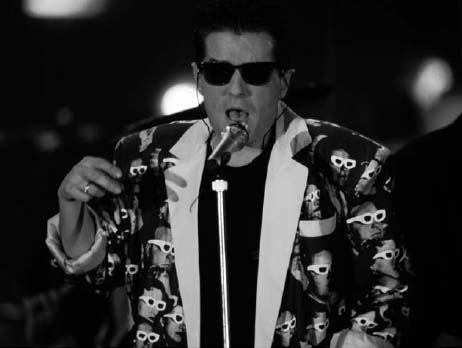The Encyclopedia of Dead Rock Stars (200 page)
Read The Encyclopedia of Dead Rock Stars Online
Authors: Jeremy Simmonds

(Drahdiwaberl)

Although his death was overshadowed by that of a genuine legend, Austrian singer Falco could, unlike Carl Wilson, claim one or two international solo hits that outsold anything by his former band. As bassist with punk band Drahdiwaberl (no, nor us), the former Vienna Music Conservatory student remained an undiscovered talent. While singing with a jazz-rock band, he became Falco Sturmer, shortening the name for his solo debut,
‘Gan% Wien
7
(1978), a controversial early single that documented Vienna’s heroin scene. Five years passed before Falco began to find any sort of international acceptance, his
‘Der Kommissar’
becoming a surprise dance smash in the US. Any possibility of a pop hit was thwarted, however, by British band After the Fire’s remarkably rapid cover, which sold a million copies in America in 1983. A disgruntled Falco returned powerfully to the spotlight in 1986 with his album
Falco 3
– which contained the ambitious slice of eighties pop that was ‘Rock Me Amadeus’. This track did the business for him, topping the charts in sixteen countries including the US and UK. But after one more hit, (the not dissimilar) ‘Vienna Calling’, Falco was gone again …

Falco: Hopefully not buried in that jacket
Not a poor man after this burst of success, Falco remained popular in German-speaking countries but took himself off to live in the Dominican Republic for tax purposes. It was here that the singer was killed, when his Jeep collided with a bus near Puerto Plata.
MARCH
Wednesday 11
Stacey Guess
(Efland, North Carolina, 21 November 1964)
Squirrel Nut Zippers
(Various acts)

Among the more unusual musical styles emerging during the nineties was ‘alternative swing’, a genre almost entirely the property of one band – namely Squirrel Nut Zippers, the unlikely unit formed by Jim Mathus (vocals/guitar/trombone) and Katharine Whalen (vocals/banjo). A former member of Pressure Boys and Sex Police, Stacey Guess, a talented trumpeter with an ear for the unusual, joined SNZ in 1993, contributing to the band’s sprightly debut,
The Inevitable Squirrel Nut Zippers
(1995). (The hyperactive Guess had a number of other projects on the go simultaneously.)
His previous musical experiences had led Guess into hard drug use, however, and he was not to enjoy the huge success the group had with the follow-up. While the million-selling
Hot
(1996) was being recorded, the trumpeter was away receiving treatment for heroin addiction. After taking an accidental overdose, Stacey Guess died in hospital, four days after falling into a coma.
DEAD INTERESTING!
NOT-SO-SUPER FURRY ANIMALS …
When choosing a name for their act, musicians might do well to avoid the word ‘squirrel’. During the nineties, the bushy-tailed varmints - in one way or another - claimed at least six lives in popular music. Just weeks after Stacy Guess’s death, punk high-priestess Wendy O Williams - latterly known as ‘The Squirrel Lady’ - also died
(April 1998).
A year on, cult French MC Squirrel AKA lost his life in an accident. Some years before, two members of promising young Florida band, For Squirrels, plus their tour manager had been killed after a high-speed blowout
(September 1995).
Then, in 2010, former Chi-Lite Robert ‘Squirrel’ Lester
(Golden Oldies #105
lost his life just a month after rockabilly musician Jim ‘Squirrel’ Garrison of Dixie Gray & The Villagers, proving that the ‘curse’ is still very much out there.
… and a couple that got away?
Meanwhile, dicing with titles like ‘Skag Heaven’, raging Kentucky youngsters Squirrel Bait did the sensible thing by going their separate ways in 1987, members enjoying rodent-free success with such seminal acts as Slint, Bastro and The Palace Brothers.
Friday 13
Judge Dread
(Alexander Minto Hughes - Snodland, England, 2 May 1945)

It was never going to be ‘high art’ with Judge Dread. A former wrestler (‘The Masked Executioner’), Alex Hughes carved himself an enviable niche in British music with his adaptations of ‘rude reggae’ hits and enjoyed a run of nine Top Forty hits in Britain during the seventies – not one of which received radio airplay. A huge fan of ska, Dread had taken his name from a Prince Buster song, and offered himself up as a bouncer at the music clubs he loved in London’s West End. Here, he befriended many of those he’d go on to emulate – among them legends Bob Marley and Clement ‘Coxsone’ Dodd, for whom he even acted as bodyguard. Dread’s own hits began with ‘Big Six’ (loosely based on Buster’s ‘Big Five’), one of three discs that spent a remarkable fifty-five weeks on the UK charts in 1972–3. Whatever his merits as an artist, he holds two records: he was the first white act to land a hit in Jamaica, and he accrued the most banned songs (eleven), with later titles such as ‘Up with the Cock’ (1978) suggesting that rather than being toned down, his work was becoming even more explicit. Apparently, Dread was even snubbed by
Top of the Pops
when he requested a ten-second slot on the show just to thank his fans. More bizarrely, one of his more innocuous songs, ‘A Child’s Prayer’, was selected by Elvis Presley for recording – though the latter’s death ( August 1977
August 1977
) unfortunately prevented this almost inconceivable occurrence.